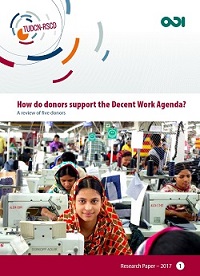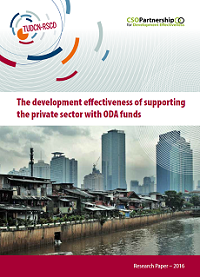Trade union participation at the HLM as observers has been standard practice in recent years. Trade unions have contributed regularly to the technical and political discussions as they have progressed towards decisions at the HLM. This year’s meeting was particularly significant in terms of the types of decisions on the table and the implications those decisions will have on donor behaviour in the future. These decisions are captured in the HLM 2017 Communique. Trade unions, represented by Paola Simonetti, provided inputs on the different agenda items and decision points.
The Development Narrative in the era of the 2030 Agenda
 The meeting opened with a general discussion about the development narrative within the OECD-DAC in light of the 2030 Agenda and the commitments which will need to be realised. During this debate DAC members focussed largely on the core competencies of the DAC and the work the Development Cooperation Directorate is presently undertaking.
The meeting opened with a general discussion about the development narrative within the OECD-DAC in light of the 2030 Agenda and the commitments which will need to be realised. During this debate DAC members focussed largely on the core competencies of the DAC and the work the Development Cooperation Directorate is presently undertaking.
On the one hand, this included issues like the role and integrity of Official Development Assistance (ODA) and the need for the DAC to outreach better to non-DAC constituents in the shaping of its work. On the other hand, there was a clear sentiment that the financing needs required to meet the Sustainable Development Goals were beyond the scope of ODA alone. On this point, the role of private finance was emphasised. Linked to this, DAC members signalled the importance of ongoing efforts to modernise the ODA concept with relation to private sector instruments and to develop more comprehensive measures like Total Official Support for Sustainable Development to better assess the totality of flows going towards SDG objectives.
In this debate trade unions emphasised that quality of development financing is as important as the quantity, especially when taking into account the resources which could potentially come from the private sector. In this respect, the centrality of the Decent Work Agenda to a plurality of SDGs was strongly emphasised, as were the international standards on human and workers’ rights and the environment, which are the bedrock of the 2030 Agenda.
To find out more on this issue, see our research paper How do donors support the Decent Work Agenda?
New Approaches to Development Finance
One of the key decisions taken during this year’s HLM was the adoption of a set of principles towards the use of Blended Financing. With many donors signalling their intention to direct more public resources into collective investment vehicles it came as welcome initiative within the OECD-DAC to develop a set of principles which could help guide how donors decide to allocate resources to what are known as innovative financing instruments. DAC members adopted the Blended Finance Principles with little hesitation.
This was a key agenda point for trade unions, as they had been involved and had inputted to the process that lead to the development of these principles. Throughout the process trade union inputs focussed on strengthening the accountability aspect of using blended finance and aimed to align these principles with the development effectiveness principles, adopted at the fourth High Level Forum on Aid Effectiveness in Busan, South Korea in 2011. Trade unions expressed their appreciation of the effort to reflect the different perspectives within the principles, but also emphasised that the principles were still short of their expectations.
With the Principles adopted, the process will now shift to developing practical guidance on how they should be used. From the trade union perspective, the guidance will be as important, if not more so, as the Principles themselves, as it will offer an opportunity to elaborate with greater precision the intent behind each principle.
The DAC and the Development Effectiveness Agenda
A discussion was held on the role of DAC members in relation to the Global Partnership for Effective Development Cooperation and its mandate to realise the development effectiveness principles. On a positive note, DAC members by and large reaffirmed the importance of the GPEDC and the centrality of development effectiveness to achieving the broad development agenda. However, the long standing struggle to engage BRICS countries in the partnership remains a significant preoccupation.
Trade unions signalled their ongoing commitment to the GPEDC and their interest in seeing it succeed. They highlighted in particular that DAC members needed to ramp up support to the completion of the “unfinished business” of the Paris Declaration and Accra Agenda for Action.
Reporting on In-Donor Refugee Costs
Another key decision taken during this year’s HLM was the clarification of reporting standards on in-donor refugee costs. Civil Society Groups had been working tirelessly on this aspect of the DAC’s work. Overall, and short of having in-donor refugee costs removed entirely from ODA accounting, there was a positive acceptance that these clarifications would make reporting more transparent and more consistent across donors, which would provide for greater accountability.
Modernisation of ODA for Private Sector Instruments
 Easily the most contentious agenda point was around the efforts to agree new rules on how donors report on public resources being channelled towards private sector instruments. Effectively, donors are seeking to set out what can and cannot be reported as ODA when private sector instruments are involved. While in general there is a common agreement that this is something that needs to be clarified, DAC members were unable to reach an agreement in this area and have essentially postponed any decision on the reporting rules. At this stage donors will continue to report as they had before and a process will continue to try to find a solution.
Easily the most contentious agenda point was around the efforts to agree new rules on how donors report on public resources being channelled towards private sector instruments. Effectively, donors are seeking to set out what can and cannot be reported as ODA when private sector instruments are involved. While in general there is a common agreement that this is something that needs to be clarified, DAC members were unable to reach an agreement in this area and have essentially postponed any decision on the reporting rules. At this stage donors will continue to report as they had before and a process will continue to try to find a solution.
To find out more on this issue, see our research paper The development effectiveness of supporting the private sector with ODA funds
The DACs revised Mandate
The culmination of a multiyear exercise of internal reflection about how the DAC operates was the adoption of the DAC’s Revised Mandate and Strategic Vision and Priorities. In general, the decision can be seen as a positive, as the broad implication is that the DAC is making efforts to be more inclusive and transparent. However, the revised mandate does not signal any fundamental shift on what the DAC does or what its role is within the broader development community.
More information:


